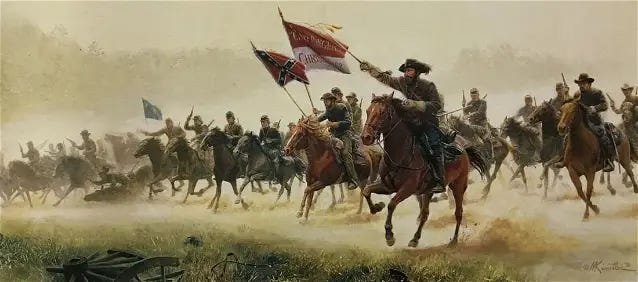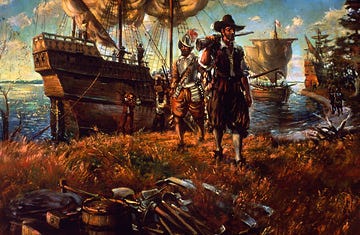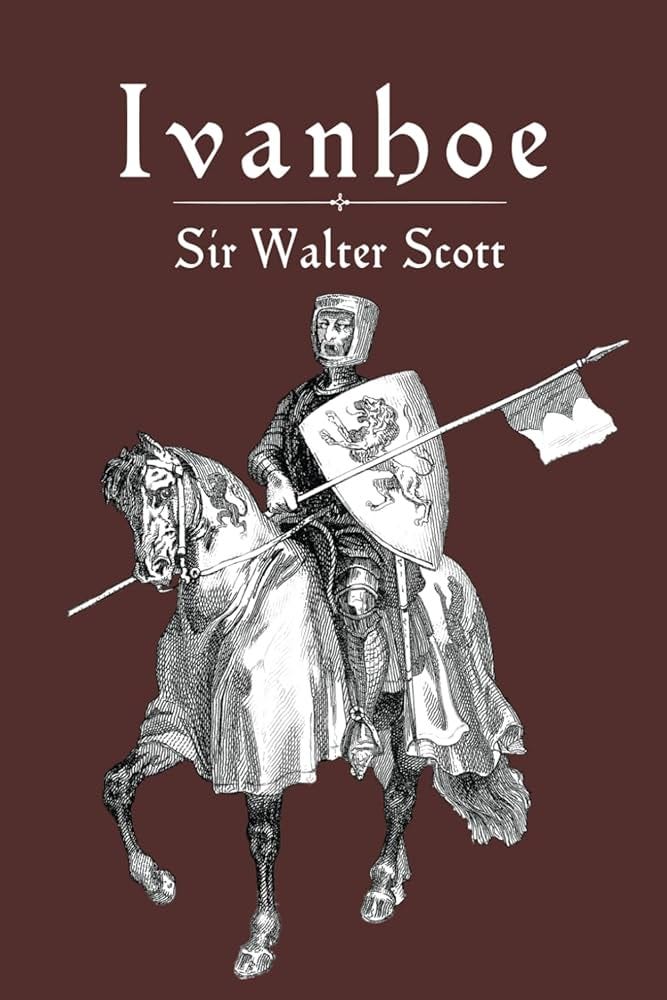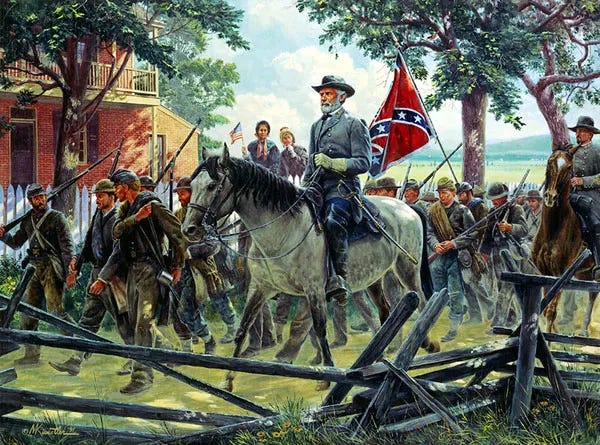Southern Soldiering
Inside the South's Proud Military Tradition
That title alone is enough to make one imagine Stuart’s daring, gray-clad legions of cavaliers, dashingly riding on McClellan’s rear with raised glinting sabers and pressed plumed hats as if the fate of the contest depended on showmanship in equal parts to generalship.
Stuart’s cavaliers are quintessential Southern soldiers - bold, debonair, and bound by honor - embodying the South’s military tradition because they represent service to country and chivalric honor, the pillars upon which that proud tradition stands.
Scholars often use Southern military tradition to describe the phenomenon of Southerners having disproportionately higher levels of military service than other regions throughout American history. However, scholars have difficulties articulating what the military tradition is and where the phenomenon came from.
The branches of Southern military tradition, like most things, stem from culture, which, in turn, is rooted in demographics. The South’s culture of honor and its accompanying carrot and sticks encourage military service among its honor-seeking young men. So, that begs the more difficult question: where did the South’s culture of honor come from?
Southern culture began when settlers aboard the Susan Constant, Discovery, and God Speed sailed into Chesapeake Bay, journeyed up the James River, and stepped foot onto Virginia’s fertile but hostile soil and settled Jamestown, the first permanent English settlement in the Americas.
The leading theory states that New England was settled by people from the highly populated urban centers of Southeast England and East Anglica. The South, on the other hand, was settled by rural herders from Scotland, Northern England, Northern Ireland, and West County. The theory goes that herds, unlike crops, were uniquely vulnerable to theft and required violence to protect due to the government's inability to deter that theft.
Outsiders often use this theory to understand Southern honor by focusing on violence, which is often falsely used to explain away black urban violence, ignoring their dearth of the paramount quality that makes Southern culture distinct and gives it its namesake: honor, but I digress. However, admittingly and frustratingly to their point, willingness to resort to violence is indeed intertwined with honor.
Fascinatingly, cultural differences between North and South are found at the chemical level. In 1996, four psychologists from Midwestern universities designed a lab experiment to test if Southerners were more prone to violence, particularly violence stemming from an assault on one’s honor. Subjects ran through a gauntlet of tests designed to provoke them, including bumping the subject in a hallway, calling him an "asshole," forcing a game of chicken in a narrow hallway, and other subtle challenges on the subject’s honor.
After provocation, Southerners were not only angrier on the outside, they were angrier on the inside, down to their neurochemistry. The increase in testosterone levels in Southerners doubled that of Northerners.
The psychologists also theorized that Southern manners could be an instinctual response to their culture of honor, meaning that if you know someone will spill blood over insults and grievances, you will be more polite to keep the peace.
Another theorized reason behind Southern honor, especially in the antebellum South, was the writings of 17th and 18th-century playwrights, novelists, and philosophers.
In particular, Sir Walter Scott, Scottish playwright, novelist, and writer of Ivanhoe, a novel that Mark Twain famously credited with killing the Confederacy, reinforced the importance of honor in Southern culture by emphasizing militaristic components of chivalry and knighthood to men in the antebellum South.
While I do not believe Sir Walter Scott invented Southern knighthood all by himself from an ocean away (many people enjoyed his writings from many places and did not establish cultures of honor), I do, however, believe Sir Walter Scott’s tales of honor gripped the gentlemen of the South tighter because those chivalric qualities were already present in their culture. Southern culture emphasized the knightly virtues of Christianity, honor, courage, protection, deference to women, and self-reliance long before Sir Walter Scott put pen to paper.
Regardless of the intricacies of its origin, Southern honor was born, and her sons consider personal honor more valuable than gold. This fact naturally brings us to the original question: where can honor-seeking young Southern men, desperate to embody those qualities engrained in their DNA and immortalized by Sir Walter Scott, attain them? Military service.
Only a few professions added to the honor of a gentleman. For example, industry, then as now, although to a lesser degree, was and is seen as particularly void of honor. Due to financial and educational barriers, most high-honor professions were restricted to the upper class, such as planters, lawyers, writers, doctors, etc. Military service, regardless of the depths of one's pockets or the esteem of one’s surname, provided a pathway for ambitious young men to obtain levels of honor that would otherwise be impossible.
Reminiscent of ancient Romans chasing gravitas, America's historical war tribe is motivated not by gold or spoils but by honor and glory, encouraging Southern men to pursue military careers and volunteer during wartime at higher levels than any other region of our culturally fractured union.





